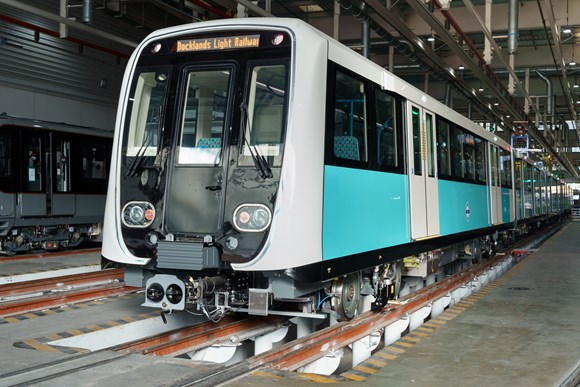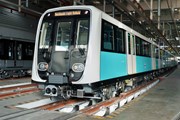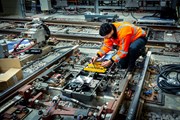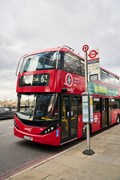
Wednesday 22 Mar 2023
Annual budget for 2023/24 shows TfL set to deliver operating surplus

PN-034
- Despite the pandemic decimating TfL's income and recent economic pressures, TfL’s annual budget for 2023/24 shows the organisation can now fully cover operational costs while investing in new bus services, Tube improvements and walking and cycling schemes across the city and outer London
- TfL's budget also shows how billions will be invested in improvements to London’s transport network, such as safer cycling routes, greener and more accessible stations, and new trains on the DLR and Piccadilly line, supported by continued Government capital funding as outlined in TfL’s existing funding agreement
- The Mayor and TfL call on the Government to ensure there is agreed longer-term funding for capital investments from 24/25, which is essential to support longer term investments, particularly for new rolling stock, signalling programmes and network extensions
Transport for London (TfL)’s latest budget shows that it will achieve an operating surplus in 2023/24, with revenues covering the costs of the existing transport network. This means TfL is expected to achieve financial sustainability and delivering transport improvements across the whole of London.
Across the next financial year, TfL’s £9.1bn in revenue will cover its expected £7.9bn operating costs – which cover the operational running of TfL services in London - £745m in capital renewals and £417m in net interest costs that it will accrue. This will mean that TfL will achieve an overall operating surplus of £79m, which will then be reinvested directly into enhancements across the transport network as part of TfL’s wider £2bn capital programme as outlined in its Business Plan, with any government funding in 2023/24 allocated to fund capital investments across the network. The budget also outlines how with continued government support for capital improvements, a wide range of schemes benefitting the whole of London can be delivered in the coming years.
Since 2016, TfL has saved £1.1 billion from its annual operating costs, and it is currently working on the delivery of £600m in further savings commitments as set out in its Business Plan. It has also worked hard to maintain a safe, affordable, reliable and frequent transport network throughout and after the pandemic.
Ridership on TfL’s bus, Tube and rail network continues to grow, with more than three million Tube journeys and around five million bus journeys made on weekdays. Ridership at weekends is now at or exceeding pre-pandemic levels. The Elizabeth line also continues to exceed predicted ridership levels, with around 600,000 journeys every weekday taking place across the whole line. While there remains a high level of uncertainty about future ridership levels, TfL’s latest assessment assumes that, by the end of 2023/24, ridership on TfL services will have grown by a further seven per cent compared to levels seen currently.
During 2023/24, the TfL Budget will ensure the delivery of a number of schemes to improve London for everyone, especially in outer London boroughs where car usage is higher. These include:
- Improving the bus network in outer London with more than one million extra kilometres of bus services with new and extended bus routes in Sutton, Croydon, Havering and Brent, as well as converting more of London’s buses to zero emission to help improve London’s toxic air.
- The first of 54 new, state-of-the-art trains on the Docklands Light Railway that promise to provide thousands of customers with more frequent, reliable and comfortable journeys from 2024, with all new trains in service by 2026.
- Progressing work to replace the 1970s-built Piccadilly line trains with a new fleet with walk-through carriages and air-conditioning. The first train remains on track to be ready to start testing from summer 2023, with the first new trains set to enter passenger service in 2025.
- Expanding the Ultra Low Emission Zone across all London boroughs from 29 August 2023, to tackle the triple challenges of air pollution, the climate emergency and congestion, and to ensure five million more Londoners can breathe cleaner air. A £110m scrappage scheme to support Londoners on lower incomes, disabled Londoners, charities and small businesses and sole traders remains open help those with non-compliant vehicles to scrap and replace their vehicles.
- Introducing the full peak timetable in May 2023 on the Elizabeth line, at which point the peak time frequency will increase to 24 trains per hour between Paddington and Whitechapel (a train every 2.5 minutes) in each direction, with 16 trains per hour running during off-peak. Direct services from Shenfield to Heathrow Airport will also commence, providing direct connectivity between east and west for the first time.
- Ensuring TfL is the strong green heartbeat of the city by making its services more sustainable through more zero-emission buses, upgrading LED lights in Tube stations and across the road network to reduce energy consumption, as well as implementing more sustainable drainage across the road network.
- Improving accessibility across London to ensure that the network is as accessible as possible. The launch of the Elizabeth line in May 2022 transformed TfL's approach to accessibility and TfL is working to make further improvements to its trains and stations in 2023/24, including the completion of step-free schemes at Knightsbridge and the Bakerloo line at Paddington. TfL’s business plan includes approximately £20m of funding per annum focused on improving accessibility across the wider transport network and TfL hopes to provide an update on accessibility schemes, including future step-free works on the Tube, in the coming months.
- Building on the 14.6km of cycle routes that TfL and boroughs have delivered since April last year, with further improvements to cycling routes across London. This will mean at least a further 39km of new or upgraded cycle routes will be delivered over the next 18 months. In addition, work on walking and cycling improvements at Lea Bridge roundabout in Hackney, Streatham High Road in Lambeth and Manor Circus in Richmond will be carried out to help encourage more people to switch to active travel, particularly in outer London. TfL's safer junctions programme will also continue to reduce collisions and improve road safety for all users.
- Completing tunnelling works and associated road changes for the Silvertown Tunnel, which will provide new public-transport options across the river and reduce congestion at the Blackwall Tunnel when it opens in 2025.
The 2023/24 budget has been developed on the assumption that the current funding agreement with Government, which lasts until April 2024, remains in place and is fully honoured, including in relation to adjusting the quantum of support provided to TfL in 2023/24 to reflect latest inflation rates.
While TfL has a current funding agreement with the Government until the end of March 2024, there is also a pressing need for the Government to confirm the £475m that TfL needs in 2024/25 to support the delivery of the committed contracts for rolling stock and signalling on the Piccadilly line and the DLR.
The Government has consistently recognised in the funding settlements that TfL is not expected to fund major capital projects from its operating incomes. This is consistent with other transport authorities. Failure to confirm this well in advance of March 2024 would force TfL to have to reprioritise its Business Plan, undoing the progress made under the current funding agreement and mean TfL would again need to start making difficult choices relating to reducing service levels, asset renewals and delaying non-committed investment.
Given the recent announcement around the delays to High Speed 2 terminating at Euston station, TfL also needs to begin procurement for additional Elizabeth line trains. These are needed to provide extra capacity once the new Old Oak Common station opens and High Speed 2 services begin in the early 2030s. Without them, there is likely to be insufficient capacity on the Elizabeth line for those looking to travel on High Speed 2, as they will need to use the Elizabeth line to travel to and from Central London until HS2 is extended to Euston station in the 2040s. Confirmation of government funding to cover the additional rolling stock is needed now to ensure that TfL can begin the procurement before manufacturing production lines at Alstom’s factory in Derbyshire are demobilised. Failing to do so would mean delays and higher costs to remobilise the workforce, source materials and ensure the additional trains are ready to enter service.
In the longer term, the Mayor and TfL are also keen for the Government to support development work carried out by Transport for London and partners on the DLR extension to Thamesmead, and to re-start its joint work on the Bakerloo line extension and Crossrail 2. These were stopped at the onset of the pandemic, and restarting this work would provide a further vote of confidence and ensure that these critical projects that can progress within the next decade, which would enable hundreds of thousands of new homes and substantial economic opportunity across London and the wider UK.
The Mayor of London, Sadiq Khan said: “We have worked incredibly hard and shown real determination to bounce back financially after an incredibly tough few years for TfL due to the impact of the pandemic. Key improvements to the transport network, like the delivery of the transformational Elizabeth line, have helped ridership climb back up towards pre-pandemic levels, further boosting London’s economy. Future improvements, including brand new DLR trains, bus services and updates to the Piccadilly line will make our transport network even better.
“Before the pandemic, prudent financial management had placed TfL on the cusp of breaking even for the first time in its history. Now, after a very difficult few years due to the pandemic, we are set to deliver a surplus for the first time ever. However, the hard work is not over and we will work with the Government to ensure we get the national investment we need to continue delivering a world-class transport network for our city – something that is so crucial to building a greener, fairer and more prosperous London for everyone.”
London’s Transport Commissioner, Andy Lord said: “I’m immensely proud of the hard work that everyone at TfL has contributed to get us to this significant point in our financial recovery. Operational self-sufficiency means we can run a safe, affordable and reliable network for all, while delivering real and vital improvements for the city as part of our vision to be the strong, green heartbeat of London.
"But it is absolutely vital that we do not let up and continue to invest in key capital improvements - including replacing trains from the early 1970s that are the oldest currently in service in the country - which can provide future capacity and economic growth, benefiting London and the firms round the country that make up TfL's supply chain. With continued Government capital investment from April 2024 we can continue to support the whole city, and make it an even better, greener, safer and more successful place.
“Our work on delivering the Elizabeth line, the Overground extension to Barking Riverside and the extension of the Northern line to Battersea have all shown the power of transport investment both to London and the wider UK supply chain. With clarity on future funding and engaging with us on plans for future network extensions now, we can unite with businesses across the country and ensure we can support growth in the UK economy both now and in the coming decades."
TfL’s 2023/24 budget has been published for approval by the TfL Board on 29 March and is available to view at https://board.tfl.gov.uk/documents/s19826/TfL%20Budget%202023-24.pdf
Contact Information
TfL Press Office
Transport for London
0343 222 4141
pressoffice@tfl.gov.uk
Notes to editors
- TfL’s current funding agreement with government can be found here: https://tfl.gov.uk/info-for/investors/funding-letters
- The level of passenger demand growth in London will determine whether funding via the revenue top-up mechanism, which forms part of TfL’s existing funding agreement with Government, is required to achieve an operating surplus.
- In September 2022, the GLA announced a £500m City Hall financing facility that TfL can call on, if needed, to balance its budget between now and March 2024, when the government funding deal expires. If accessed, any money used would be withheld from later funding from the GLA to TfL – https://www.london.gov.uk/media-centre/mayors-press-releases/mayor-establishes-new-facility-ensure-tfl-can-balance-its-budget









